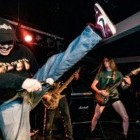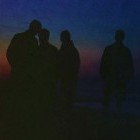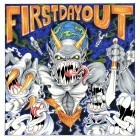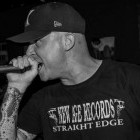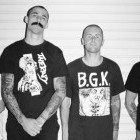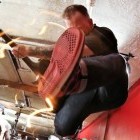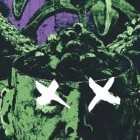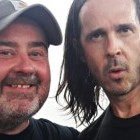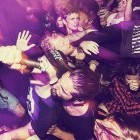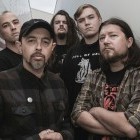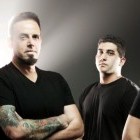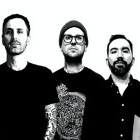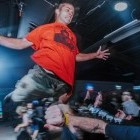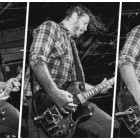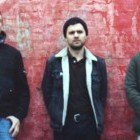.jpeg)
Introduce yourself to everyone.
Thanks for thinking of me to do this. My name is Chad and I play in the L.A. hardcore band, Strife.
How did you get into playing bass guitar?
I started playing basically when the band asked me to. We were kids, still in high school at this time, and the guys were starting a band (Stand As One). It was formed as a straight edge band and Scotty, who was on bass for them, stopped being straight edge. I should back up and say back then our crew was pretty tight. We were the only hardcore kids in our town. We all went to shows together (which in those days were an hour or two away) and most of us went to the same schools. Because hardcore was a growing scene back then, everyone pretty much knew or knew of everyone. Prior to Stand As One, Sid was playing drums with Riverside band S.D.I., Andrew owned a guitar and they were jamming. Rick was singing for a band called Monster Club and he came over to do vocals. When Scotty was playing with Stand As One and decided to not be straight edge anymore is when the guys called me up.
I owned a second hand guitar that I use to fuck around on, but didn’t know any chords, notes... I didn’t know shit. I really just held it and watched music videos or pretended I knew how to play the Downcast 7”. I fucking loved watching metal videos in the afternoon after school and would love to rip like those guys. Anyway, they asked if I could get my hands on a bass and if I wanted to be in the band. I didn’t even need to think about it. It was awesome to be asked to play and learn with friends that were already in my life.
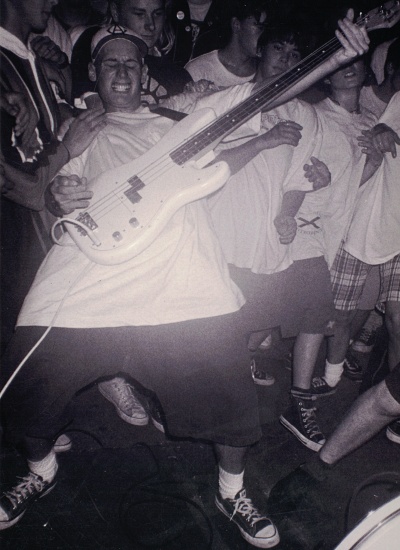
Do you play other instruments?
I kind of need to clarify I don’t really “play” anything. I think to play something is to understand it. I often say I am not a bass player, but I play the bass. I don’t understand theory or anything like that but I hear something cool and I am always trying to figure it out. I never really took lessons and when I did I didn’t have the patience for them. Back to the question, I play a little bit a lot guitar and played guitar for the band that came to be known as Nineironspitfire when I lived in Seattle for a short while and still play guitar almost every day but I’m also terrible at that.
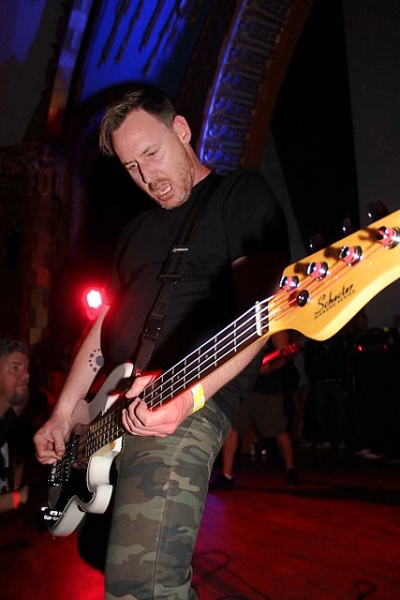
Can you play and sing at the same time?
Sometimes? It depends on the song or how intricate the part is that’s splitting your focus. For a lot of our songs we have been playing them for so long that some things become second nature, but with the newer stuff it is harder to shift the focus when you know that your locking in with the rhythm and stand a pretty good chance of fucking up if you’re more concerned with some vocal part coming up. If I am playing bass then thats what I’m there to do, but definitely doing vocals is fun. They’re hard, but fun. Respect to singers man. How they don’t just black out sometimes is beyond me.
Was Strife the first band you recorded and toured with?
Yeah, I didn’t do anything before Strife.
Did/does your family support your music?
Kind of a deep question with a lot of sides. My parents never really supported anything I did that somehow didn’t involve going to school. Not to bust them up or anything... my mom would always give me shit about taking off and playing shows and my dad wasn’t in the picture after I was 15. My stepfather was an amazing person but also self made and didn’t see a future for me in music. He’s since passed and my mom and I don’t speak anymore, so no worries there for seeking approval from them. My wife is an incredible support system and my sister and her family always excited when we’re doing anything. For most of my life my band have been honestly the brothers I never had, and the best kind I can ask for. We’ve spent the majority of our lives hanging out together, traveling around and playing music. They’re my dudes.
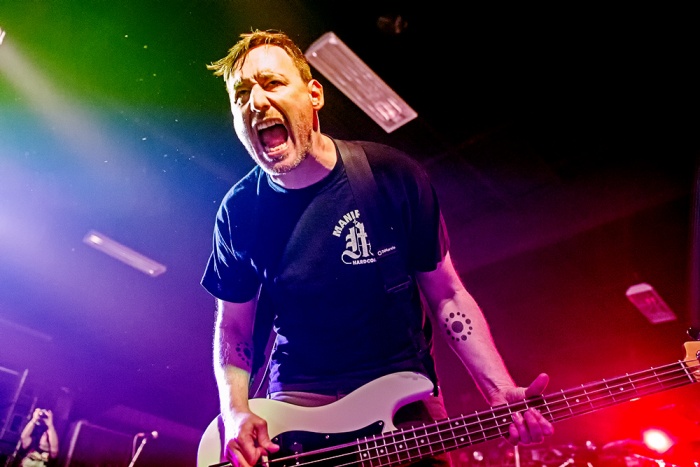
How did/do you write your bass parts with the band?
I learn the songs as we turn them out. Strife has never really been a bass driven band so most of my stuff is playing along and providing low end rhythm to what the guitars are doing. I’m really not that technical of a player and approach the style as if I were playing guitar first and then move it over to bass.
Do you downstroke or upstroke more in the songs?
I don’t really think about it. I lock in the riff how I feel it. As a general way of playing I’ll never upstroke any beginning or ending part or anything left to an open hang. I lose all control of the string or note when that happens and the translation through the amp, you can tell, gets shot. Those will all be downs, but otherwise I just do what feels natural. There’s no rhyme or reason to it for me.
I first started playing guitar in hardcore bands. You were one of the first bassists I latched onto. Your style along with others during the '90's—Ashli State (Guilt), Ramsey Grissom (Enkindel) Scott Winegard (Texas Is the Reason)—put bass hooks in my head. I started being able to come up with bass parts on my own. You really helped me to be able to lean into why bass was so necessary.
Straight up—that’s huge for me to hear and thank you so much. I’m very humbled to hear that coming from you. Also, really cool to be lumped in to some bands we sound nothing like but I dig they’re style.
Who influenced you when you were starting out?
When I first started playing nothing really existed for tone outside what bass you played, what pick ups you had and your amp/cab combo. There weren’t really any effects, compressors or anything that bassists were using back then, so dialing it in naturally was really important. GK, Ampeg—those were the heads you wanted to be playing. I went from a GK to using a Fender when I started which provided super natural tones, but I’d look to the guys that were doing it back then and had the best tones. Obviously the Bass Master General Craig Setari (Sick of It All, Straight Ahead, Rest in Pieces) pretty much set the standard for how you wanted to sound if you were playing hardcore. Little Dave from Ressurection was not only a madman when it came to performing live but his natural bass tone was so tight. I was listening to a lot of East Coast bands back then like Flagman and Fountainhead—Winegard has such bass control while he’s throwing that thing around.
We were floating around old Burn demos that we use to send each other through the mail and their shit was so heavy. That 7’ leveled up for me and then when I heard "New Morality" I was blown away. Again, bass didn’t really stand out back then with a lot of heavier, faster bands, but these guys brought rhythm and style. Recording budgets were usually paper thin and mixing down ended with drums and guitar. You could say the game changer for me would have been Sergio Vega (Quicksand, Absolution, Deftones). He was not only locking in thick tones and providing solid rhythm with Alan’s drumming and Walter's playing, but he was also fucking with some chorus back then which is when I really started thinking about effects.
Quicksand changed a lot of my perception musically. Later down the line guys that kept raising the bar like Manny from Glassjaw who were just doing what they were doing but really brought out of the box styling to how rhythm really cut through in heavier music. Dudes with raw talent, something I do not (emphasis) possess. Since I’m pretty subpar on talent bury a lot of it in tone.
How did you meet Andrew Kline (Strife, Berthold City, World Be Free)?
We were kids that grew up in the same neighborhood. He went to the Jr. High across the street from where I lived and hung out with the skaters and punks. I went to a private school down the way. Our schools use to let out around the same time and those guys would always stash their boards off school grounds or at our friend Pat's house. My friend Tony and I always kind of use to be around. We would skate near those kids hoping I could make some new cooler friends since we kind of didn’t have any and were total nerds. Drew was always cool and introduced me to this world. I would see that he’d be wearing a Minor Threat shirt so I’d go check out Minor Threat, it went on from there... M.O.D., Subhumans, D.R.I. and then into hardcore. Drew always wore band shirts back then and he introduced me to this.
We hung out a lot as kids. We used to cause all kinds of trouble in our neighborhoods growing up. There’s a shit load of stories, which seriously talking about what we use to do should be another No Echo section on its own, but he is and will always be my brother that showed me cool music when I was younger and helped me keep my head on straight. Probably never would have X’d up if it wasn’t for him. Actually, I never would have since being friends with him showed me hardcore.
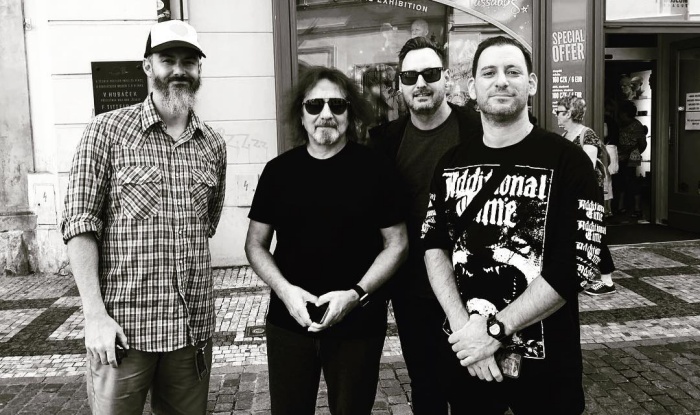
I owned the One Truth VHS tape and wore it out with my friends. We would watch it in our basements and freak out (stage dives off couches and breaking holes in our parent's drywall). Did you know it was gonna be such a great tape, or was it a happy accident?
I think (feel) that watching that video provides an honest insight of what driving around the country in a van, sleeping on the floor, pissing in bottles, pulling in to new cities with no sleep and getting chased through the streets of Chicago, having that van break down in Colorado, not knowing what happened to said van because you’d end up having to fly home (seriously… we just left it), is actually like. Shit was cool man—you know... not many people back then got to experience hardcore out of their own towns. Now shows are all over the internet, but that shit (literally) didn’t exist back then. There were no cell phones, there was no GPS and shit was actually hard. If you got lost on your way to a venue you’d have to pull over and hope you had enough change to call a promoter and then hope that dude picks up the phone or you’re leaving a message and waiting at a pay phone for who knows how long.
I’m happy with the documentary. It really was a look into how touring with us was like back then. Just check out the parts where we wouldn’t let Jeremy go to sleep or where Tony has to chill in a tiny spot between the passenger and driver seats for states on end. Not to mention how dope those shows were. Some really good memories and friendships came from that run.
The first time I saw and met you guys was when Supertouch opened for you in Connecticut a few years back. You all sounded amazing. People are always swarming the stage. Have you ever been unplugged by a fan?
Oh, yes. I’ve been running wireless for a long time but they’ll always find a way to get a cable out or even we’ll crash in to each other’s gear. You think after 25+ years there’d be some finesse to it but I actually love the chaos of things going wrong and having to scramble to get it going again.
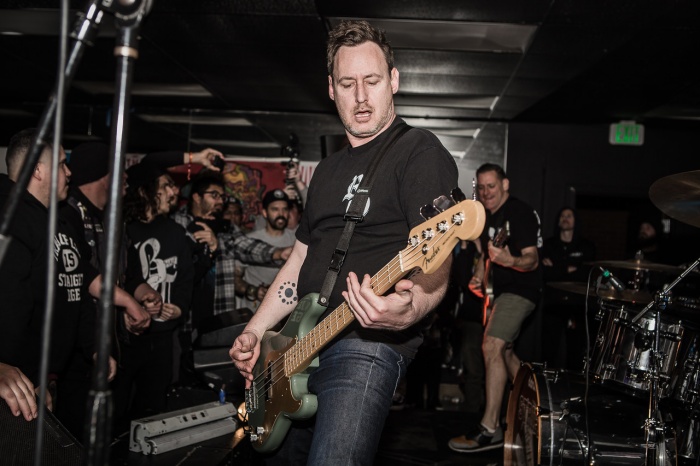
How many bass heads have you blown throughout the years?
Virtually every bass head I have owned has met some form of fiery or electrical demise. It’s funny to think about when you get drawn in to running pedals that the input is designed to only take so much signal, so if you’re drenching it with a ton of pedals (even wireless, tuner, effect, noise suppression) solid state amps, which I was mainly playing, aren’t built to take all of that in.
What is your current bass guitar, amp, and pedal combo?
It’s funny that you ask “current” because I am always switching this up, but I really think I am happy with what I have going on now. As far as heads go, I am currently playing a Fender Bassman 800w hybrid through a Fender 8x10 4ohm Bassman cab. For touring I use a Fender Rumble 500 or 800 head due to the lightness and power it omits. I can pack it and I do travel with my own head since when you’re playing out of state or in another country (the Rumble 800 has intelligent sensing power for whatever countries wattage you may be dealing with) it may be borrowed or rented gear and you don’t really have enough time to dial in a tone, sound check or maybe every stop is a new piece of equipment. I stopped doing that a long time ago.
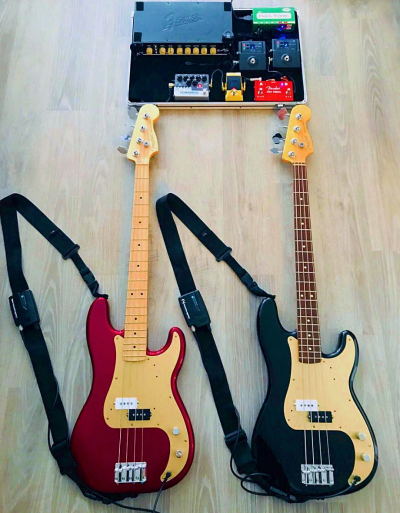
Right now my set up is built to work with most other country's power so I can go almost anywhere and not worry about needing a converter. I wanted to be confident with not only the sound I was giving every night but a compact yet powerful enough set up that could handle both festival and club shows simultaneously. Also, how bad would you feel borrowing a breaking someone else’s shit? I’ll just use my own. Pedals right now I am using the dark glass micro tubes pedal. I let go of Sansamps since they really were providing too much hot signal and the drive was a bit too much grit and not enough punch for me. I mean they are the pedal but the Darkglass pedal has such a sweet effect that really rounds out the tone.
I bring 2 Audio Technica System 10 Stompbox wirelesses with me that sit in my pedal case. Sometimes I’ll run a Nuxcore Looper if the set we’re doing that night requires samples. I play Fender American Standard Precision Basses and all are outfitted with EMG Passive pickups. If you own a Precision with the standard factory pickups do yourself a favor and swap those out for the EMG’s immediately. I also hear a lot of good feedback about Seymour Duncan Quarter Pounders but just changing out those pickups, if your bass is passive, will bring so much more to your tone and output balance.
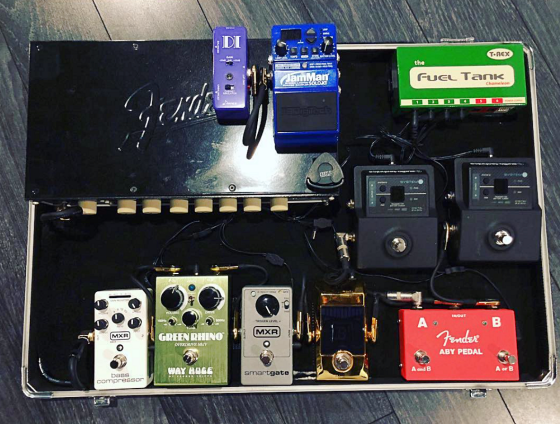
Are there any drummers in your life that have progressed your playing?
For real, every drummer I’ve ever played with but none pushed me to be a better player as much as Sid [Niesen]. He would always force me to lock in even though I was super shitty. I had zeros sense of timing so when it came to songs like "Grey" or "Stand As One," where I have some solo parts with no beat, I’d be all over the place. We’ve always had really dope drummers but if it wasn’t for Sid back in the day I wouldn’t be able to carry it with drummers like Pepe [Clarke] who has been with us for a while now. He’s an animal.
I love your Instagram account. Is there anything rad your up to in your personal life?
You must mean the @travelswithchad account because my personal one is not great [laughs]. My wife, Celeste, and I travel a lot. Wherever we go we find some cool shit that we like to pass on to viewers but the catch is there’s always something a little wrong with what we're talking about. It’s slightly inaccurate because we just roll up, we'll look the place up super quick and have to say 15 seconds about it but most of the time we forgot some of what we just read. It’s fun and people seem to dig it. The regular job is managing club venues in LA for a concert promoter called Goldenvoice and we do a ton of shows. That keeps me really busy. Strife hitting Europe in October with Risk It, so really psyched on that. I’ll probably change up my bass set up again just for the occasion. We also have 2 of the best dogs you could ask for.
Are there any Strife recordings you wish you were louder in?
On One Truth and In This Defiance, I was a basket case in the studio. It took me forever to get the riffing right, timing was way off on my parts but when we went in to record Angermeans I was a lot more comfortable. Flash forward to that record coming out and the final mix was total shit. It really was like a bad joke when we heard the final version. Our publicist at Victory sent me a review that said “Chad Peterson’s bass is non-existent on this album." I thought “cool” and then got depressed because that record may not have come out how we wanted it to but we believed in a lot of the songs and really would have liked to have another go at it but Victory said nah and we moved on.
When we went in the do Witness a Rebirth we recorded with Nick Jett and Andrew was there with me through the process, Todd was hanging out for some of my tracking and those guys really took a lot of the pressure off and that record came out sounding great. The feel and flow of recording has been a lot better for me personally after those first couple records were done. I’m also (thankfully) not the player I was 25 years ago and am a lot more intuitive when it comes to changes and timing.
Finally, do you have any parting words of wisdom for young kids picking up the bass and starting bands?
Don’t let the fact that you may not be very good at it to start with discourage you. As long as your band and your friends support you and drive you to work harder that’s the best you can ask for. Also, take some time to learn something about the business surrounding what you’re doing. I’m fortunate in that being in this band segued in to what I do for a living in concert promotion, but hardcore needs promoters, labels, venues, people that understand this scene and this music. It’s a culture. Support those that are already doing these things. Help your local scene out by booking shows.
Lastly, if you ever need to know how to go about doing things like this hit me up. Got a question on a riff? Hit me up. Gear question? Hit me up.We live in an age where we’re easily accessible. Let those of us that have been doing this for a bit help out the next generation of bands, promoters, labels and venues. Just take it nice and easy. Don’t try and rush anything. Everything’s cool.
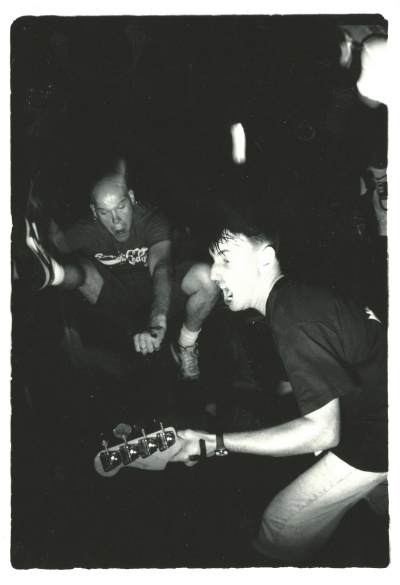
***
I've admired Chad for a very long time. Watching him with Strife stills scares me. They are musically so talented, and brutal live. I hope you guys are enjoying these. If anyone has any good questions I'm not thinking of, leave a message in the comments section below!
Tagged: bassist spotlight, strife

